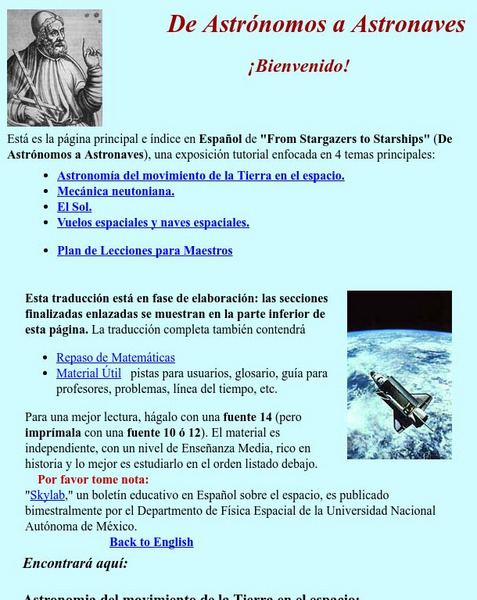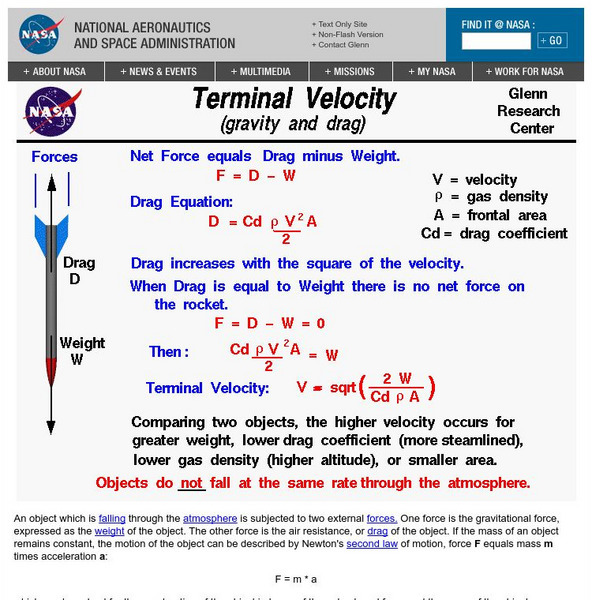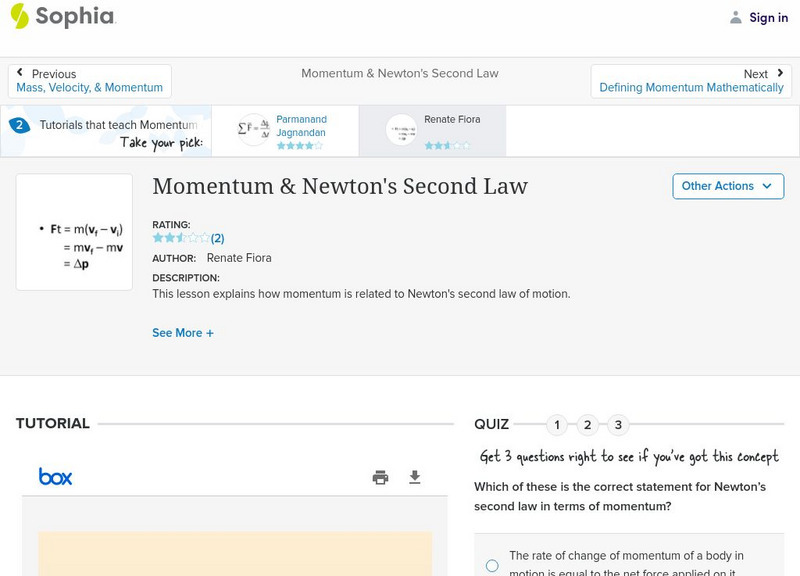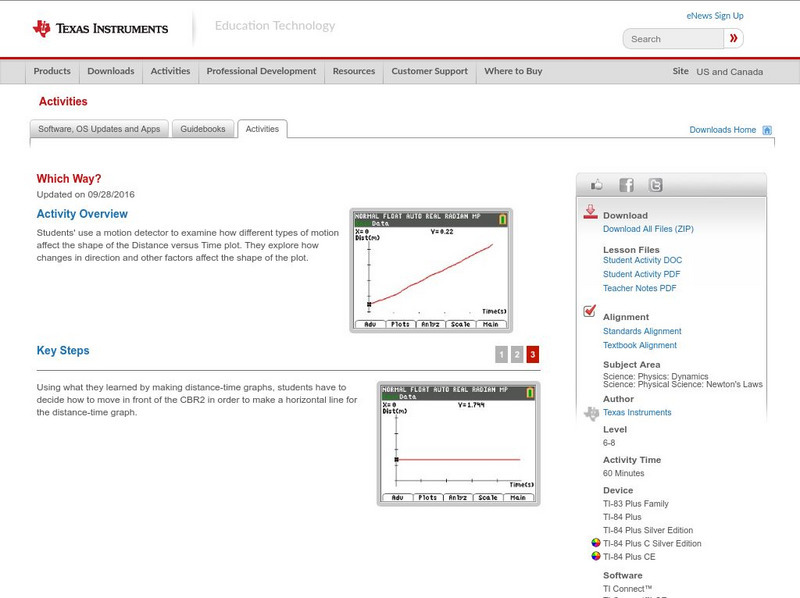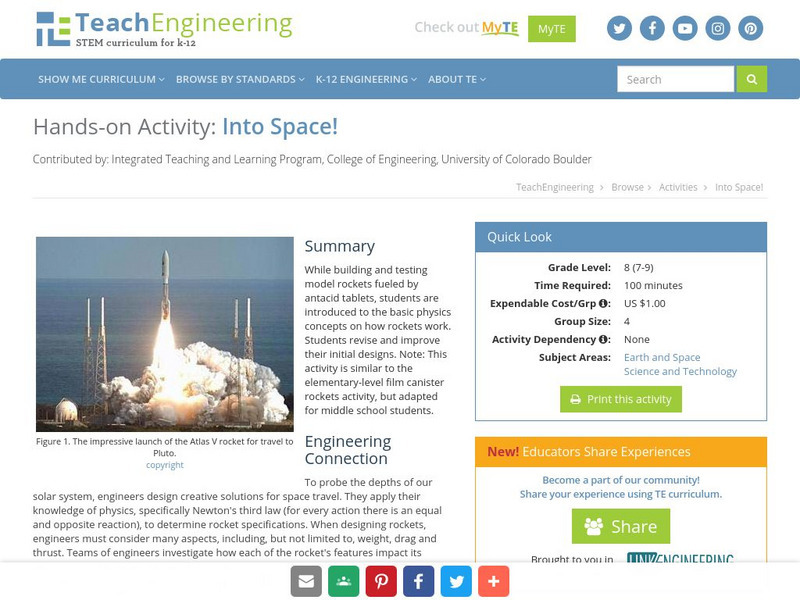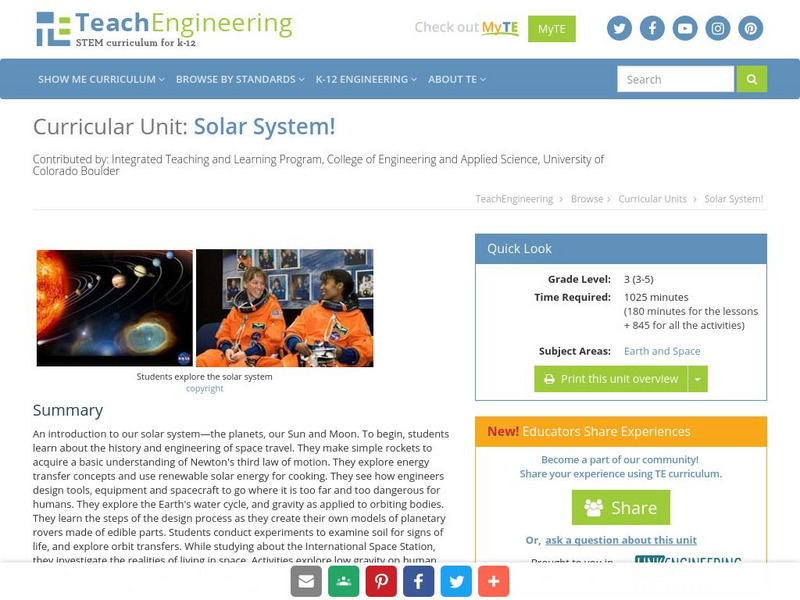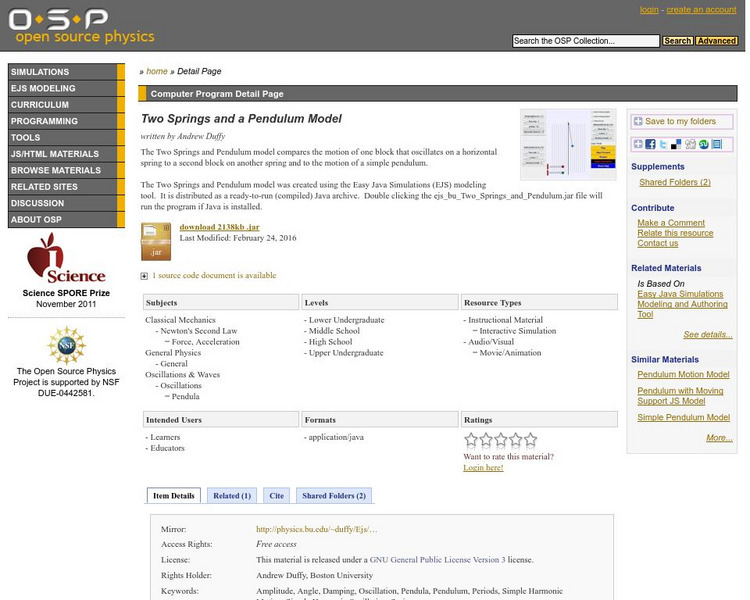Hi, what do you want to do?
Other
Phy6: De Astronomos a Astronaves
This site contains four main categories: Astronomy of the Earth's motion in space, Newtonian mechanics, the sun and spaceflight and spacecraft.
NASA
Nasa: Beginner's Guide to Aerodynamics
This site from NASA uses a colorful graphic to illustrate why objects reach terminal velocity. Provides equation for the terminal velocity of an object. Graphic is accompanied by a simple explanation.
University of St. Andrews (UK)
University of St. Andrews: Orbits and Gravitation
A page describing the physics, mathematics, and historical figures associated with planetary motion, satellite motion, and universal gravitation.
Science Education Resource Center at Carleton College
Serc: Water Bottle Rockets Understanding Energy
In this activity, students will design and construct a water bottle rocket. Students will demonstrate understanding of a good experimental design and analysis of results.
Physics Classroom
The Physics Classroom: Determining the Net Force
Online classroom site explaining the concept of balanced and unbalanced forces. The site has examples and exercises for the student to review and try.
Michigan Reach Out
Newton's Apple: Soccer
Learning physics can help you win your next soccer game as well as prepare you for your science studies.
Sophia Learning
Sophia: Momentum & Newton's Second Law
This lesson explains how momentum is related to Newton's second law of motion.
ClassFlow
Class Flow: Forces in Action
[Free Registration/Login Required] This flipchart explains weight and gravity and engages students in activities using force and motion.
Physics World
Physics World: Contextual Physics in Ocean Park
After downloading the "Motion Video Analysis" software, users can collect data about moving object's position from digital movie clips. This collection of data will allow them to plot motion graphs and draw conclusions about physics in...
Texas Instruments
Texas Instruments: Match Me!
In this activity, students move in a specific way in front of the motion detector to create motion plots that match a given Distance versus Time plot. They make connections between types of movements and characteristics of Distance-Time...
Massachusetts Institute of Technology
Mit: Open Course Ware: Angular Momentum and Conservation
Students explore angular momentum and conservation. Some topics examined in the activities are angular momentum, torque, and conservation. The resource consists of video clips, lecture notes, practice problems, and exam questions....
Texas Instruments
Texas Instruments: Which Way?
Students' use a motion detector to examine how different types of motion affect the shape of the distance versus time plot. They explore how changes in direction and other factors affect the shape of the plot.
American Association of Physics Teachers
Com Padre Digital Library: Open Source Physics: Swinging Atwood's Machine Model
Variation on the standard Atwood's Machine model, where one hanging mass swings like a pendulum and the other remains stationary. Manipulate the conditions and observe the results.
CK-12 Foundation
Ck 12: Torque
[Free Registration/Login may be required to access all resource tools.] In this online lesson students will learn about Torque and how to calculate Torque in various situations.
TeachEngineering
Teach Engineering: Into Space!
While building and testing model rockets fueled by antacid tablets, students are introduced to the basic physics concepts on how rockets work. Students revise and improve their initial designs. Note: This activity is similar to the...
TeachEngineering
Teach Engineering: Solar System!
An introduction to our solar system: the planets, our Sun and our Moon. Students begin by learning the history and engineering of space travel. They make simple rockets to acquire a basic understanding Newton's third law of motion. They...
Physics Classroom
The Physics Classroom: Circular and Satellite Motion: Newton's 2nd Law Revisited
In this interactive module, students use free-body diagrams, Newton's second law equation, and circular motion concepts to analyze a variety of physical situations involving the motion of objects in circles or along curved paths.
American Association of Physics Teachers
Com Padre Digital Library: Open Source Physics: Two Springs and a Pendulum Model
Swing virtual pendulums and compare the motion of one oscillating weight on a horizontal spring to a second weight on another spring. Then, compare how these motions differ from the motion of a simple pendulum.
Scholastic
Scholastic: Study Jams! Science: Force and Motion: Newton's First Law: Inertia
A video and a short multiple-choice quiz on the meaning of inertia.
CK-12 Foundation
Ck 12: Fifth Grade Science: Earth Science: Gravity
Do you know how gravity affects you? This module defines gravity and explains how gravity affects the motion of objects.
Physics Classroom
The Physics Classroom: Momentum and Collisions: Fish Catch Interactive
Students explore the relative mass of two colliding objects, and determine if that can be used to quickly predict the post-collision speed of the objects? An activity sheet guides learners through the process of determining the rule for...
TeachEngineering
Teach Engineering: Aqua Thrusters!
In this activity, students construct their own rocket-powered boat called an "aqua-thruster." These aqua-thrusters will be made from a film canister and will use carbon dioxide gas - produced from a chemical reaction between an antacid...
Physics Classroom
The Physics Classroom: Vectors: Forces in Two Dimensions:equilibrium and Statics
Through examples and practice problems, this interactive tutorial helps students understand forces that are in a state of equilibrium with a net force of zero.
University of Maryland
Thinking Problems in Oscillations and Waves
A series of thought-provoking, multichoice questions from the University of Maryland on the topic of oscillations and waves. Equations for calculating the period of motion for masses on springs, pendulums, sounds, and waves on a string...





